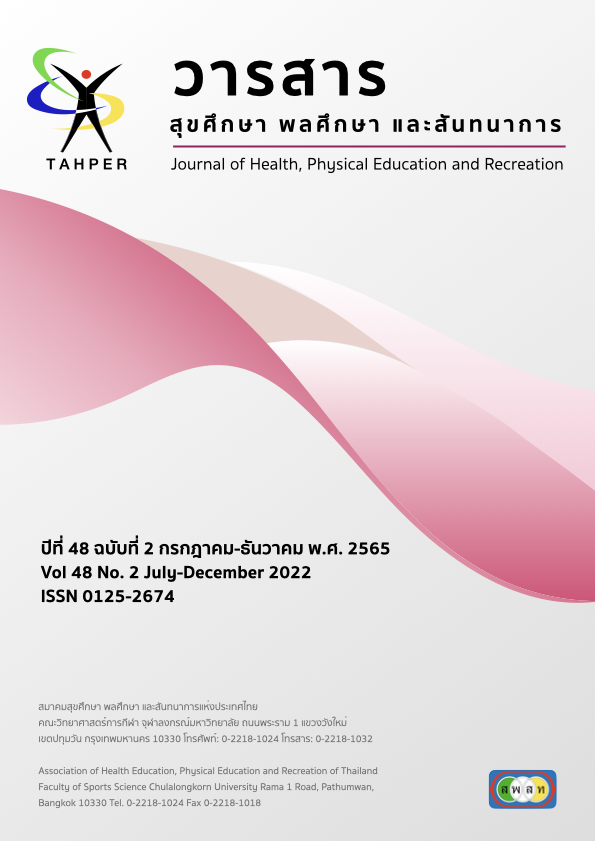ประสิทธิผลของโปรแกรมสุขศึกษาโดยประยุกต์ทฤษฎีความสามารถตนเองในการปรับเปลี่ยนพฤติกรรมเพื่อลดอาการปวดหลังส่วนล่างของคนวัยทํางานในบริษัท The Efficacy of The Health Education Program Using The Self-Efficacy Theory of Behavior Modification to Reduce Lower Back Pain in Office Workers
Main Article Content
Abstract
บทคัดย่อ
การวิจัยในครั้งนี้เป็นการวิจัยกึ่งทดลอง มีวัตถุประสงค์เพื่อศึกษาประสิทธิผลของโปรแกรมสุขศึกษาโดยประยุกต์ทฤษฎีความสามารถตนเองในการปรับเปลี่ยนพฤติกรรมเพื่อลดอาการปวดหลังส่วนล่างของคนวัยทำงานในบริษัทเอกชนแห่งหนึ่งในจังหวัดกรุงเทพมหานคร คัดเลือกกลุ่มตัวอย่างแบบเจาะจง จำนวน 40 คน แบ่งเป็นกลุ่มทดลองและกลุ่มเปรียบเทียบ กลุ่มละ 20 คน กลุ่มเปรียบเทียบเป็นพนักงานสาขาบางนา และกลุ่มทดลองเป็นพนักงานสาขาคลองตัน ซึ่งกลุ่มทดลองได้เข้าร่วมโปรแกรมสุขศึกษาโดยประยุกต์ทฤษฎีความสามารถตนเองที่ผู้วิจัยสร้างขึ้น กลุ่มทดลองเข้าร่วมโปรแกรมสุขศึกษาโดยประยุกต์ทฤษฎีความสามารถจำนวน 4 ครั้ง ครั้งละ 60 นาที เป็นระยะเวลา 2 สัปดาห์ แต่ละครั้งประกอบด้วยกิจกรรม 4 แผนกิจกรรม ดำเนินการเก็บข้อมูลก่อนและหลังการทดลอง ประเมินประสิทธิผลโดยแบบสอบถามการรับรู้ความสามารถตนเองต่อพฤติกรรมการดูแลตนเองเพื่อลดอาการปวดหลังส่วนล่าง แบบสอบถามความคาดหวังในผลของการมีพฤติกรรมเพื่อลดอาการปวดหลัง แบบสอบถามพฤติกรรมการดูแลตนเองเพื่อลดอาการปวดหลังส่วนล่าง แบบประเมินระดับอาการปวดหลังส่วนล่าง (NRSs) วิเคราะห์ข้อมูลโดยใช้ค่าร้อยละ ค่าเฉลี่ย ส่วนเบี่ยงเบนมาตรฐาน เปรียบเทียบค่าเฉลี่ยของผลลัพธ์โดยใช้สถิติ paired t – test และ independent’s t – test ผลการวิจัยพบว่า ภายหลังการทดลองกลุ่มทดลองมีการเปลี่ยนแปลงของคะแนนเฉลี่ยการรับรู้ความสามารถของตนเอง ความคาดหวังในผลลัพธ์และพฤติกรรมการลดอาการปวดหลังส่วนล่างเพิ่มขึ้นมากกว่าก่อนการทดลองและมากกว่ากลุ่มเปรียบเทียบอย่างมีนัยสำคัญทางสถิติ (p < 0.001) และระดับอาการปวดหลังส่วนล่างลดลงกว่าก่อนการทดลองและลดลงมากกว่ากลุ่มเปรียบเทียบอย่างมีนัยสำคัญทางสถิติ (p < 0.001) ดังนั้น จึงควรให้มีโปรแกรมสุขศึกษาโดยประยุกต์ทฤษฎีความสามารถตนเองให้คนวัยทำงาน โดยเน้นสร้างความตระหนักและรับรู้ให้คนวัยทำงานสามารถปฏิบัติกิจกรรมต่างๆ เองได้และให้บุคคลใกล้ชิดหรือคนในครอบครัวเข้ามามีส่วนร่วม โดยเน้นเทคนิคการสร้างการเรียนรู้ที่เหมาะสม
คำสำคัญ : โปรแกรมสุขศึกษา ทฤษฎีความสามารถตนเอง อาการปวดหลังส่วนล่าง
Abstract
The purpose of this quasi-experimental research was to study the effectiveness of the health education program applying self-efficacy theory to reducing lower back pain behaviors of Working-Age people in Bangkok Province. Purposive selection was used to select a sample of 40 participants who were divided into 2 groups, experimental and comparative groups with 20 in each. The comparative group was employees of Bangna branch and the experimental group was Klongton branch employees. The experimental group participated in the health education program by applying the theory of self-efficacy constructed by the researcher. The experimental group participated in the health education program by applying the ability theory 4 times 60 minutes each time for 2 weeks. Each session consisted of four activities. Collecting data before and after the experiment. The effectiveness was assessed by a self-efficacy questionnaire on self-care behaviors for reducing low back pain. The questionnaire had high levels of outcome expectations for behaviors to reduce back pain self-care behavior questionnaire for reducing low back pain (NRSs). Data was collected by interview and analyzed with analytical statistics, percentage, mean, standard deviation, paired t–test and independent’s t-tests. The results found that after participating in the program, the experimental group's self-efficacy and outcome expectations for behaviors to reduce back pain were higher than before participating, and all three measures differed from the comparative group significantly (p < 0.001). The group’s level of NRSs also decreased significantly (p <0.001). This health promotion program for exercise should be promoted to benefit self-efficacy among working-age people and stimulate the attention and care given in supporting them with an appropriate learning process.
Keywords: Health education program, Seft-Efficacy Theory, Lower back pain.
Article Details

This work is licensed under a Creative Commons Attribution-NonCommercial-NoDerivatives 4.0 International License.
Critical thinking in journals is the right of the author. The Association of Health Education, Physical Education and Recreation of Thailand is not always required, to create diversity in ideas and creativity.
ความคิด ข้อวิพากษ์ในวารสารเป้นสิทธิของผู้เขียน สมาคมสุขศึกษา พลศึกษา และสันทนาการแห่งประเทศไทยไม่จำเป็นต้องเห็นชอบด้วยเสมอไป เพื่อให้เกิดความหลากหลายในความคิดและความสร้างสรรค์


